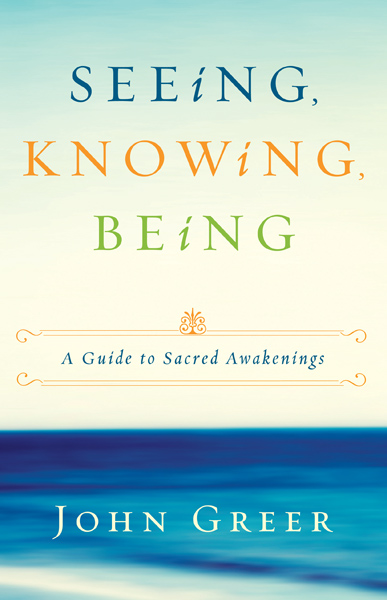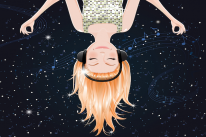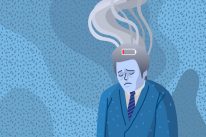
Note: The winners for this giveaway have already been chosen. Subscribe to Tiny Buddha for free daily or weekly emails, and to learn about future giveaways!
The winners:
Regardless of our individual beliefs, we all want to feel a sense of wholeness to experience the present moment with peace and connection.
It’s the foundation of spiritual practice, however we define that individually: We want to stop feeling a need to fix ourselves, and instead awaken to the infinite beauty of who we already are.
In his powerful new book Seeing, Knowing, Being, meditation teacher John Greer explores insights from a wide range of spiritual traditions, inviting us to challenge our perceptions and thought patterns to access our inner knowing and experience oneness with the world around us.
Laden with evocative metaphors, the book breaks complex ideas into understandable parts, inviting us to challenge what we think know for a greater awareness of what actually is.
I highly recommend Seeing, Knowing, Being to anyone looking to explore or deepen their understanding of non-duality.
The Giveaway
To enter to win 1 of 2 free copies of Seeing Knowing Being: A Guide to Sacred Awakenings:
- Leave a comment below
- Tweet: RT @tinybuddha Book GIVEAWAY & Interview: Seeing, Knowing, Being http://bit.ly/O9HQWS
If you don’t have a Twitter account, you can still enter by completing the first step. You can enter until midnight PST on Sunday, July 29th.
The Interview
1. Tell us a little about yourself.
I was born into a loving and deeply religious family. It was a time in my life when all seemed right in the world; every question found an answer and my faith felt strong.
Though I had once considered going into the ministry, when I left for college new and provocative ideas challenged many of my assumptions about religion.
As a young adult, I spent many months traveling through South America, Asia, and Africa, and served two years in Nepal with the Peace Corps. My exposure to other peoples, cultures, and faiths only increased my misgivings and called into question the idea that the religion I happened to be born into had a monopoly on spiritual truth.
My graduate studies—with coursework on experimental analysis of behavior, operant conditioning, and a disregard for matters of the spirit—further reinforced my skepticism.
In 1994, I picked up a book on Zen Buddhism that stirred something deep within me, and my journey back to wholeness began. I have practiced Buddhist insight meditation over the ensuing years. While I have enjoyed teaching meditation over the last decade, it is into this book that I have poured most of my energy. It is the culmination of my own search for what was missing in my life.
2. What inspired you to write Seeing, Knowing, Being?
Foremost, it was a deep desire to give something back—to share with others what has been life-transforming for me.
For decades, an undercurrent of emptiness had replaced the peace of mind I enjoyed as a childhood believer. I felt spiritually lost, vulnerable, and alone in a vast universe apparently insensitive to human consciousness—until I discovered a spiritual practice that fit for me, found my teacher, and began serious vipassana practice,
Now I feel as if I have come home. There is a sense of joy, peace, and freedom, even when I have to face serious challenges, and this book is an attempt to mark the trail as best I can.
3. Your premise is that we don’t have to “fix” ourselves. Why do you think people have a difficult time accepting who they really are?
When we are told that realizing spiritual truth and divine wholeness is simply a matter of awakening to what we already are, it is hard to imagine.
For many, like myself, raised in traditional Christianity, the idea of original sin burdens us like a spiritual version of inherited debt, leaving us with the idea that we need redemption. Then there are the thundering revelations of Copernicus, Descartes, Darwin, and Freud. They jettison many outdated superstitions but, along with them, our very sense of place in the world around us. And there is clearly little hint of anything exalted in the human behavior portrayed in the evening news.
In contrast, what are called the “nondual” traditions, which I talk about in the book, offer a glimpse of the divine wholeness concealed behind the mask of the separate ego-self. They tell us that it is our identification with the conventionally recognized ego-self that blinds us to our true nature.
4. You’ve written that we are taught to see a fragmented reality from early childhood. How are we taught this?
When we are born, our vision is fresh. The world as we first experience it is undifferentiated and timeless, and we have no real perception of self or other.
Our parents initiate the process of identification with self when they name us, and it is endlessly reinforced as we grow up. We are taught to see a reality with numberless divisions, distinctions, labels, and judgments—so that we can find our way through this dualistically envisioned world.
The structure of language itself deepens the delusion even further. Every verb requires a subject, and we say I, me, my,and mine almost every time we speak.
Conceptual habits become unconscious assumptions that automatically frame our reality.
The dos and don’ts, the “yours” and “mine,” of childhood become liberal and conservative, believer and infidel, friend and foe of adulthood, and we seldom even suspect the possibility of seeing in another way.
5. In Chapter Two, you referenced Alan Watts’ assertion that we “thing” the world we see. What does this mean?
Thought does not tell us what we are seeing but rather what to see. We inherit our vision of reality along with the language we are taught to speak.
As children, we sometimes amused ourselves by imagining faces, animals, or other objects hidden in the clouds. If we were playing the game with our friends or parents, the things we could identify were limited to concepts we shared. Recognizing the conventional representations of such objects—a clown face, a rabbit—we could agree when one was found. Of course, the clown or rabbit existed in our eyes only and had no reality otherwise.
The same is true for everything we perceive. The world is made of “things” differentiated by our mental faculty from an organic process of ever-changing energy patterns. The “things” that seem to exist are created by thought in the same way that children find objects in the clouds.
6. In the chapter related to time, you highlighted that we have an obsessive relationship with time. How does this wreak havoc on our lives?
In modern society, it is common to feel as if we are living in the fast lane, an unending rush hour where there just don’t seem to be enough hours in the day. In a world of smart phones and email, texting and Twitter, the very devices that are supposed to save us time can have the opposite effect as we hurry to respond to everyone and everything.
The truth is, when our minds are filled with competing thoughts and tensions or we’re frantically multitasking, we are less effective in everything we do. We are distracted drivers, mindless snackers, poor listeners. Jumping from thoughts of the past and future, we do a lot of thinking but little living.
Time is a convention without which modern society could not function, but if we recognize it is only a tool, and not reality, we can more effectively return to the present moment and the natural rhythms of our true nature.
7. In Chapter Six, you’ve written that our deepest attachments often pertain to spiritual matters. Can you expand on that?
The key to understanding attachments—and the reason that issue is so prominent in the “nondual” teachings—is the recognition that letting go is a necessary prelude to liberation.
Ironically, some of our deepest attachments are anchored in spiritual matters. We lose our freedom when we are shackled, no matter the type of restraint. When bound even by the golden chain of our cherished spiritual beliefs, we can become prisoners of our own minds.
Certainty about our own views can close the door to true insights.
8. How does our delusion of self lead to suffering?
The world is vast and we are only a small part of it. Through our mistaken identification with the separate self we believe ourselves to be, this tiny fragment of what is, we see life from a very narrow perspective.
With fixed ideas about the way things should be, we struggle all our lives to force the vastness of being to conform to our ideal. But the world does not bend to our personal agendas, and when we cannot let go, we suffer.
Suffering is like rope burn: when we hold on too tightly to our attachments and desires, as to a rope slipping through our hands, pain is inevitable.
9. What are a few simple things we can do to live in accord with our true nature?
Wherever you are is where you need to be. Practice mindfulness anywhere an opportunity presents itself. Like a mirror, don’t react to what you see. Only witness the flow of life, without clinging or aversion. This passive, utterly receptive form of awareness is crucial to unraveling the riddle of who we are.
Whether you are doing simple, repetitive chores at home or out in public, open your awareness to as many of the sensations in this moment of life as you can. While waiting in a doctor’s office, for example, feel the sensations in your body, your breath. Notice the details of your surroundings. Listen to the ambient sounds.
Open to the possibility of glimpsing the extraordinary in the ordinary, the absolute wonder of it all, as if the place comes alive, as if you awakened from a dream for a moment.
Learn more about Seeing, Knowing, Being: A Guide to Sacred Awakenings on Amazon.
FTC Disclosure: I receive complimentary books for reviews and interviews on tinybuddha.com, but I am not compensated for writing or obligated to write anything specific. I am an Amazon affiliate, meaning I earn a percentage of all books purchased through the links I provide on this site.
About Lori Deschene
Lori Deschene is the founder of Tiny Buddha. She started the site after struggling with depression, bulimia, c-PTSD, and toxic shame so she could recycle her former pain into something useful and inspire others to do the same. You can find her books, including Tiny Buddha’s Gratitude Journal and Tiny Buddha’s Worry Journal, here and learn more about her eCourse, Recreate Your Life Story, if you’re ready to transform your life and become the person you want to be.
- Web |
- More Posts













 Though I run this site, it is not mine. It's ours. It's not about me. It's about us. Your stories and your wisdom are just as meaningful as mine.
Though I run this site, it is not mine. It's ours. It's not about me. It's about us. Your stories and your wisdom are just as meaningful as mine.
I like this line: “Open to the possibility of glimpsing the extraordinary in the
ordinary, the absolute wonder of it all, as if the place comes alive, as
if you awakened from a dream for a moment.”
I love how he says ” Thought does not tell us what we are seeing but rather what to see.”
its very true
I would love to win this book. I cannot tell you the reasons why… my heart is just drawn to it.
I love this site! I would love to win this book!! I studied women’s studies and English Lit in college and you would never guess that my degree was an awakening. Women’s Studies is where I learned of the “other” and I realized that I had been doing this my whole life. Always basing my life off of the “other”.
I loved this:
With fixed ideas about the way things should be, we struggle all our lives to force the vastness of being to conform to our ideal. But the world does not bend to our personal agendas, and when we cannot let go, we suffer.
I would love to win this book and learn more about what I can do. And of course, when I was finished reading it, I will pass it on to someone else! 🙂
thank you for sharing your interview with john greer. soon i will be unemployed for the first time in 15+ years. it was not my choice but here i am. this sounds like the perfect book to add to my short list of books i would like to read to help guide me through this phase and unto the next. alane
i love this site and the newsletters i recieve
This site and the daily messages I receive have kept my head up in times of adversity. I cannot tell you how much it is appreciated 🙂
I’ve been going through a process of awakening and welcome any thoughts, study, literature and conversations of the topic.
This fell right in line with a book I started this morning by Jon Kabat-Zinn, Wherever You Go There You Are. The idea of mindfullness is much easier than the practice of it!
Thank you for sharing the interview. I am currently seeing a personal coach and working on quieting my mind, focussing on what is important, and acceptance. This past year has been somewhat stressful. I had taken a new job opportunity at the beggining of 2011 and it did not work out. Unfortunately I have been unemployed now for the past twelve months. This book would really add to the process I am going through.
Mindfulness is my destination, but its been a long journey. Would love this book. May help me live in the moment.
Love this!
Great site. I hope to win the book! Haha. 🙂
I’d really like to have this piece of jewellery in my knowledge !
Wonderful interview. Thank you.
Even if I don’t win a copy, I think I’m going to have to go buy a copy. 🙂
I am struggling with depression because I can’t find the way to loving myself. This book would help me learn to love and accept myself
Wonderful site and author
I don’t have a Twitter. This looks like an awesome book!!
This book looks great. Definitely adding it to my must read list.
I love the idea of wherever you are is where you need to be!
I am 50 years old. My spouse of 20 years is filing for divorce. I am so in need of this book. I believe the path of life is filled with many choices in which direction to take… I am stepping towards mindfulness on my own without much success. I am wanting to achieve living and enjoing THE MOMENT. I can breathe… I am alive…. I would like to be present.
This looks like a great read!
I love the idea of recognizing our place in the world isn’t the biggest or best place – it’s a small place and we have much to learn. “The world is vast and we are only a small part of it…”
As per the meaning of this all, I hope this book lands itself in the hands of the person who is ready for these teachings…
I cannot wait to read this! It sounds amazing!!!
As a recent high school graduate I am seeking guidance as the world begins to open up to me. A lifetime of decisions are starting to present themselves and I feel overwhelmed by it all, perhaps this book could help me.
Thank you for the wonderful interview and link to this book. My father is currently suffering from psychological abuse, and he just cannot see a way out. Thankfully, he won’t commit suicide, but that is no way to live. I would like to help him help himself to ease his pain. I think this book would help him get back on the right track and start to let go.
Excellant post, thank you.
Boy do I need this. Going through a difficult time. It is so easy to forget to be mindful. Can’t wait to read.
After reading this interview, I am very excited to read this book! Thank you!
I would love to ready this while deployed to Afghanistan and share the knowledge.
Need more of this in my life.
I find it fascinating when others come forward with stories of moving from an inclusive, doctrine-oriented belief system to one of being open and observant without judgement. This is the path I have been following for almost 30 years now, and I find I still have so much to learn. Moments of clarity and opening to the present are fleeting for me, but I am continually seeking to understand the principle of it. When I am in those moments I feel I completely understand, but when they are past it is so difficult to hold on to them. I think so much of it is the practice, the choosing of what to believe and how to react despite the circumstance. Reminding myself that I *can* choose what to believe or feel in any given moment, or to even remove myself from making those decisions to just observation. I’m still working on this. 🙂
These ideas are certainly not taught much in the Western world of christianity, and never in the absolute dogma of the church I grew up in. But, growing up with these ideas of absolutism & ferver of belief lead me on a path of learning how to critically look at my beliefs and actively change them to be more fluid and dynamic. This, truly, has opened up an entirely new world of insight and wonder. And I believe this is key to changing the entire order of our society, by teaching this kind of opening of belief, along with critical thinking & intuitively listening, all governed by compassion for ourselves and others. I think this is the next step for all of us.
It is reassuring to know that even one so much further along this path than I, still struggles with the same things – the fleeting clarity and beauty of moments that slip through my fingers are a source of ongoing excitement and frustration.
I am currently doing the Deepak 21-day Meditation Challenge, and would love to read this as I work on my personal journey. I find myself embracing my inner peace and sharing that with others each day. It’s a wonderful feeling, ”
Whether you are doing simple, repetitive chores at home or out in public, open your awareness to as many of the sensations in this moment of life as you can. While waiting in a doctor’s office, for example, feel the sensations in your body, your breath. Notice the details of your surroundings. Listen to the ambient sounds.” This truly resonates with me 🙂
I don’t believe in others telling me how to find my way. but I do believe in the universe giving me signs. so if I get this book, I might change my mind…
I would love to win this book, starting my journey toward badly needed inner peace and enlightenment, and I need all the knowledge / help I can find. I am @gretchenbarton on twitter
This book looks wonderful. Tiny Buddha reminds me daily to breathe and reconnect with my self and my surroundings. Thank you for sharing!
This sounds awesome! The book sounds similar to Pema Chodron’s work, which I love.
Thank you tinybuddha.com ! Today’s post made me laugh when I realized that the unpleasant stress I often feel, is my own choice!
Reading your interview with the author of “Seeing, Knowing, Being ….” imparts a sense of peace and wanting to break free of turmoil, in my first chakra, the place which is most affected with physical pain when an upsetting event touches my life. Thank you for sending this my way, I have printed it in its entirety so I may read it often and learn from it. I would be please to be entered into the give away for this book. Sincerely, MaLa SaHan.
would love to read this.
This seems like an awesome book, thanks!
I find the difficulty of accepting yourself a very common problem for me. I have recently embarked on a journey of meditation and self-acceptance in order to overcome severe anxiety and shame. Thank you for the interview and insights. It’s amazing how powerful one’s thoughts are an integral part of the total well-being and how they can absolutely derail a person.
This looks like a great read, I would be very grateful to receive it. Tiny Buddha is a very inspiring site to read in the mornings… 🙂
would live to win this book…sounds great!
It seems like ideas like these just keep popping up in my world lately. I’d love to read this book, but even if I don’t, I look forward to these lessons that life seems to love throwing my way.
I love his comment about time. I feel that is my problem. I am constantly multitasking and getting wrapped up in replying to everyone so that I never feel like I am actually LIVING.
I can’t wait to read this book!
This sounds like an excellent book with good “advice.” I have shared
many of the journeys he describes and have come to similar conclusions.
It’s hard for anyone to open up to new/different viewpoints with
consideration that “mine” is not the only “correct” viewpoint. Having
only started practicing mindfulness in the last few years, it has made a
difference in how I view the world. My difficulty lies in expressing
how I feel, especially with my family of origin. I would like to be able
to share more with them, and think that perhaps this book might be
helpful in this.
I deserve to win a copy because i’m poor and i never win anything 🙂